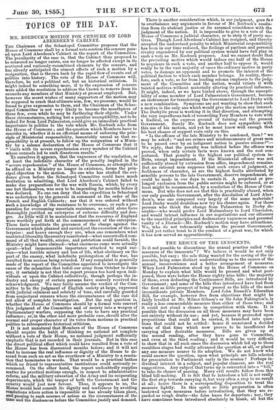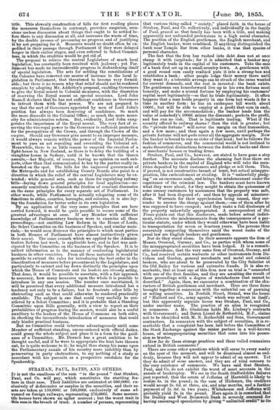THE RESCUE OF THE INNOCENTS.
Is it not possible to discontinue the annual practice called "the massacre of the innocents "P We believe it would be not only possible, but easy ; the sole thing wanted for the saving of the in- nocents, being some distinct understanding as to the causes of the annual inconvenience and a better arrangement of measures. When Lord Palmerston stood up in the House of Commons on Monday to explain what bills would be pressed and what post- poned, there were before the House eighty-nine bills : the majority of these, even deducting the Continuance Bills, are introduced by Government ; and some of the bills thus introduced have had from the first as little prospect of being passed as the bills of the most inconsiderate private Members. Lord John Russell's Education Bill, for example, however free from objections that might be fairly levelled at Mr. Milner Gibson's or Sir John Pakington's, is really a less commendable measure than either of those two; and it could not stand a chance in competition with them. It is possible that the discussion on all those measures may have been not entirely without its use ; and yet, because it proceeded upon propositions that could not be carried, it branched into ques- tions that could not be settled : hence it occasioned a decided waste of that time which now proves to be insufficient for carrying other desirable measures. Bills are given up at the second reading, after they have gone to Committee, and even at the third reading ; and it would be very difficult to show that in all such eases the discussion which led up to those resultless stages had really advanced the question at all, or placed any one measure nearer to its adoption. We do not know who could answer the question, upon what principle are bills selected for presentation to Parliament early in the session ? Perhaps in- dividual interest in a subject, and popular clamour, are the real suggestives. Any subject that turns up is converted into a "bill," to take its chance of passing. Many evil results follow from this blind bill-making. It is felt that to introduce a bill is not really the first step towards carrying it, but very often a step to no result at all ; hence there is a corresponding disposition to treat the measure lightly. In this spirit so little preparation is often bestowed upon measures before introduction, that they are re- garded as rough drafts—the false bases for departure ; nay, they have sometimes been introduced absolutely in blank, all but the
title. This slovenly construction of bills for first reading places the meastres themselves in contempt, provokes suspicion, occa- sions useless discussion about things that ought to be settled be- fore there is any discussion at all, and increases the waste of time, by the double process of presuming no progress and of justifying it by not preparing for it. Measures would no doubt often be ex- pedited in their passage through Parliament if they were delayed longer in their earlier stages, and even referred to Select Commit- tees, in tvhieh the crudities would be got rid of. The proposal to relieve the central Legislature of much local legislation, has constantly been received with jealousy ; yet Par- liament has made no inconsiderable progress in disburdening itself of special legislation. The sets for settling the constitutions of the Colonies have removed one source of increase to the local le- gislation in Parliament, that threatened to become very formid- able ; but there is no reason why that relief should not be rendered oemplete by adopting Mr. Adderley's proposal, enabling Governors to give the Royal assent to Colonial measures, with the discretion of reserving the Royal assent on special occasions. Lord John Russell declares that he has not sufficient confidence in Governors to intrust them with that power. We are not prepared to say that the sort of Governors appointed by men of Lord John's position has always been deserving of confidence. So much the more discredit to the Colonial Office; so much the more neces- sity for administrative reform. But, evidently, Lord John exag- gerates the importance of the Royal assent. The very fact of re- serving the viceregal power to the Governor is sufficient protection for the prerogatives of the Crown, and through the Crown of the empire. Should any Governor give assent to an improper measure, it would always remain within the power of the Imperial Parlia- ment to pass an act repealing and overriding the Colonial act. Meanwhile, there is as little reason to suspend the erection of a light-house in New Zealand, as there is to delay the building of a slaughter-house in Sydney, until it be known that the Queen assents,—her Majesty, of course, having no opinion on such sub- jects, other thah that communicated to her by the parties really in- terested on the spot. The bills for the improved government of the Metropolis and for establishing County Boards also point to a direction in which the relief of the central Legislature may be ex- tended; while general acts, such as those for regulating railway bills—laying down general principles for local application—ne- oeesarily contribute to diminish the friction of constant discussion on the same principles for every separate act of Parliament. In other words, while Parliament is actually relegating some of its &fictions to eities, counties, boroughs, and colonies, it is also lay- ing the foundation for better order in its own legislation.
By an application of the very same principles that are here carried forward, it would be quite possible to secure some of the greatest advantages at once. If any Member with sufficient knowledge of Parliamentary business were to examine all these proceedings,—not omitting Law Reform in the House of Lords, the Select Committee on the business of Speaker, and similar mate- rials,—he would soon discover the principles to which most parties in both Houses of Parliament have almost instinctively •given their assent. The same remark which we applied to the Adminis- trative Reform lastweek, is applicable here, and in fact was anti- cipated by the Committee on the business of the Speaker. It is to -collect information as to the manner of conducting legislatorial business in other countries. From all these materials it would be possible to extract the rules for introducing the best order in the classification of measures before presentment to the Legislature, and particularly to extract and lay down distinctly the principles upon which the House of Commons and its leaders are already acting. That done, it would be possible to ascertain, with a fair approach to accuracy, how many measures upon the whole it is possible to introduce in any one session. The number once ascertained, it will be perceived that every additional measure introduced has a tendency not only to be a failure, but to frustrate other bills by obstructing such as that could otherwise be rendered practically available. The subject is one that could very usefully be con- sidered by a Select Committee; and it is probable that a Standing Committee upon Bills generally, with a view to report on their probabilities of progress during the session, would also be a useful auxiliary to the leaders of the House of Commons on both sides, in checking the inconsiderate introduction of measures that could only hinder practical business.
But no Committee could intervene advantageously until some Member of sufficient standing, unencumbered with official duties, could grasp the whole subject and place it in a form for the guid- ance of a Committee. Mr. Disraeli has a great ambition to be thought useful, and if he were to appropriate the hint here thrown out, he is quite welcome to it : he might thus stamp his name upon the Parliamentary annals of his country more indelibly than by persevering in party obstructions, to say nothing of a study so accordant with his pursuits as a prospective candidate for the Speakership.



































 Previous page
Previous page